Tricks and tips to clean vegetables and fruit naturally to remove pesticides without chemicals or filling up the landfill with plastic. All we use to clean vegetables and fruit naturally is a bar of veggie soap that we make! Yup, you heard me right, I personally use an unscented veggie dish soap stick to clean and wash all my vegetables and fruit naturally.
I have successfully done this practice for over 25 years. I can attest I have never had a soap film, residue, or after-taste from using this unscented handmade soap to clean vegetables and fruit naturally.
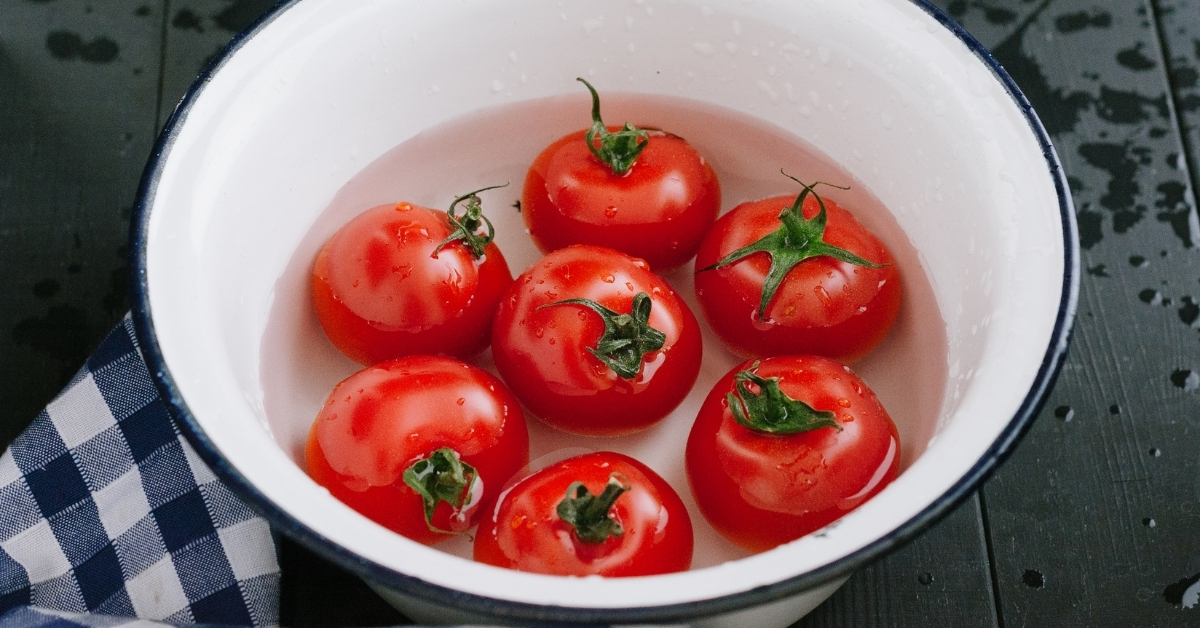
Table of Contents or Collapse to Hide
Veggie Soap vs. Liquid Veggie Wash
There are a few reasons to use a veggie bar of soap versus a “prepared veggie wash in a jug” from the store. First, there is no plastic jug to fill the landfill like the liquid stuff. Second, the veggie soap stick is all-natural, made with only 2 natural ingredients.
Finally, the veggie soap stick works three-fold by cleaning produce, dishes, and your hands also. An added bonus is the soap is 100% biodegradable, unlike the plastic jug!
Doesn’t it make sense to naturally clean your fruits and vegetables by not un-naturally clogging the landfill with plastics and using something has doesn’t have mostly water in it?
Can You Use Regular Soap for Cleaning Vegetables?
Many commercial liquid and bar soaps use essential and fragrance oils to scent their products. Using an unscented soap without essential oil ensures that a flavor is not is carried over to the foods from the essential oils.
I have many customers who have used a certain liquid ” bottled food wash” for years and once they tried our unscented veggie soap stick, they literally tossed the jug and switched to our handmade natural soap stick for washing their produce.
Baking Soda for Cleaning Produce
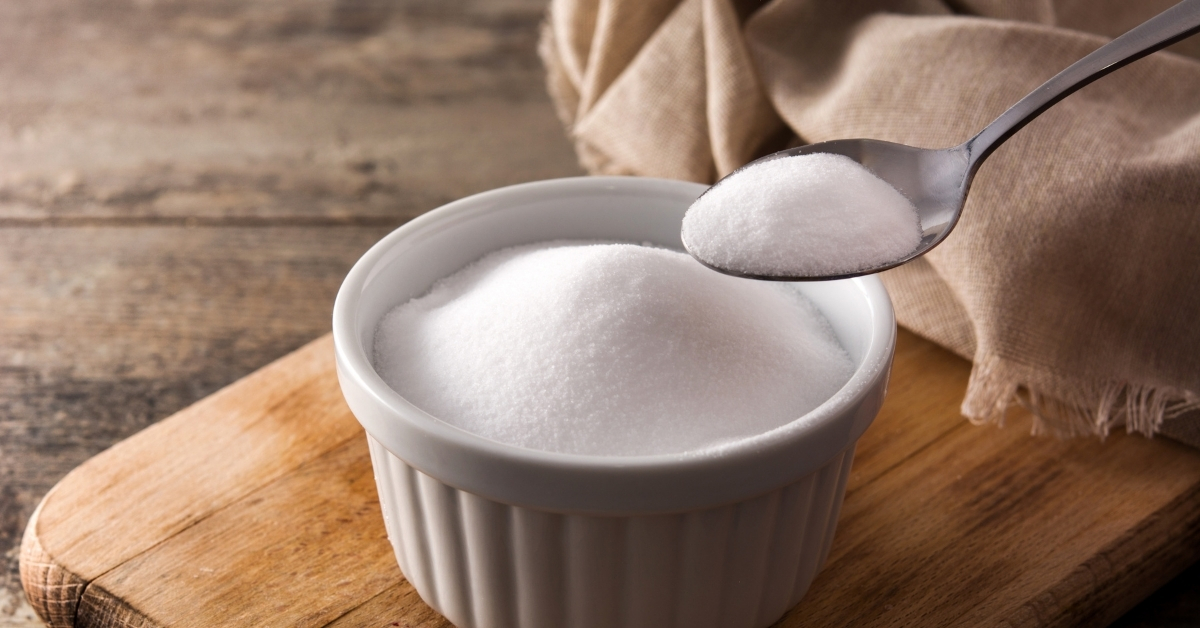
Occasionally, I will use baking soda along with my veggie soap bar on tough particles stuck on the produce. Baking soda gives a little more grit for scrubbing. It is a great natural cleaner that I use every day for many so other uses in my home. Check out the link below to find out how many different ways to use baking soda.
Baking Soda Benefits and Uses is another post filled with valuable information, please check it out!
How to Clean Vegetables From the Garden
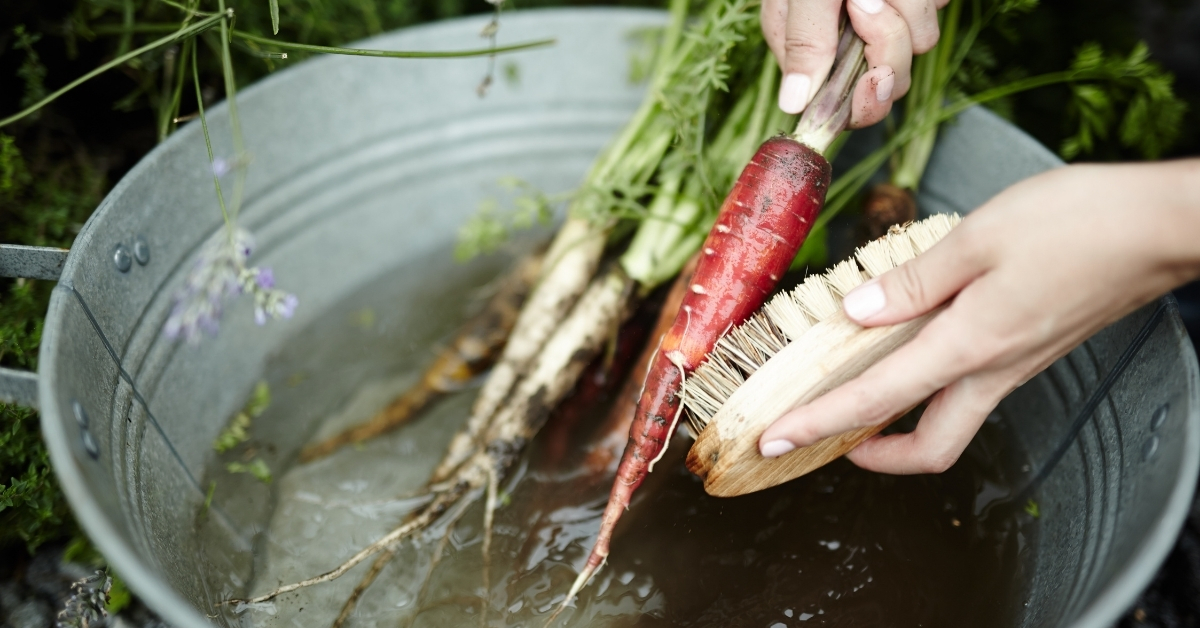
I am fortunate that I have an outside garden sink to clean the vegetables straight from the garden. I use the same process as I do in the final cleaning in the kitchen. I rinse the soil off the vegetables and place them in a basin with a swish of a veggie soap bar in the water and allow them to soak for 5 minutes in the water.
Cleaning Organic Foods
We pay good money for our produce and even more for “organic” food, which cuts down on a lot of harmful pesticides but does not eliminate all contaminants from our produce. You should always clean vegetables and fruit by washing your produce before eating whether the food is organic with a veggie soap.
Organic produce has fewer harmful additives added to them. However, even though the food may be organic, there are still harmful bacteria in the produce. This may have transpired in the water and soil where the product has grown. The produce may also be contaminated during the harvesting, transportation to store and to your home from the store, local market, or produce stand.
Why is Washing Produce So Important?
Washing your fruits and vegetables prior to eating is vital for good health. Washing may prevent foodborne illnesses caused by Salmonella, E. coli, and Listeria. It’s imperative that all the cutting utensils and cutting boards are sanitized prior to use also.
Many vitamins are in the skins and peels of vegetables and fruit. It’s important if we are to consume the skins and peels for good health; they need to be the cleanest imaginable. Washing with a veggie soap and rinsing with filtered water will definitely help to ensure that.
Is it Safe to Eat Raw Skins on Fruits and Vegetables?
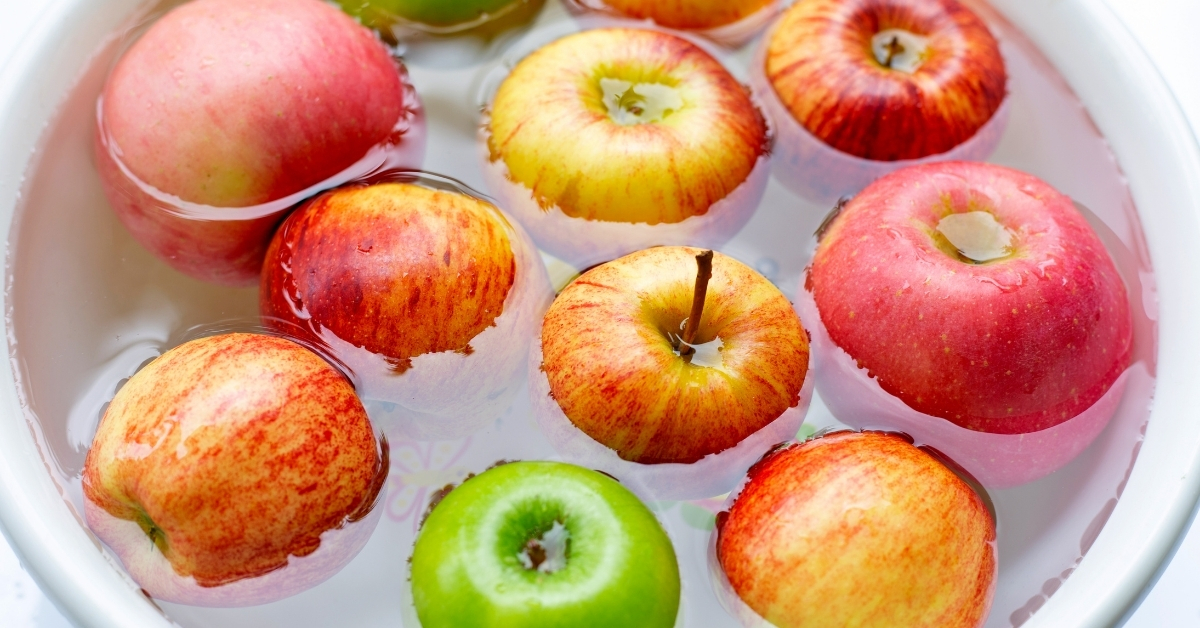
Cooking produce to 135 degrees will be an effective measure to kill dangerous bacteria that we have missed during a rushed cleaning. But what about when we eat the produce raw? Then, we need to ensure we eliminate pesticides and bacteria as much as possible. This can be done by rinsing well with filtered water, scrubbing with a veggie soap, and rinsing again with filtered water.
Clean Vegetables and Fruit Organically
Ensure the prep area is clean starting by washing your hands and utensils before touching the produce. Did you know the average person places their produce under running water for less than 15 seconds which is not an effective time or method to remove dirt, bacteria, and pesticides? I can understand that. I have to remind my husband that a quick swish does not do the trick for having clean produce.
A more aggressive practice needs to be taken to ensure our final produce will be healthy for our bodies. This can be achieved by using the rinse, scrub, rinse (optional-spray with peroxide or cider mix in a glass bottle), rinse and pat dry method.
When Should You Wash Produce?
The answer to that would be, all the time. The same goes for steaming, fermenting, chopping, or freezing. Another good question asked is, “should you wash produce before storing it”? I personally do not do this. Wet produce stored in the refrigerator can absorb odors and bacteria and if not dried can cause mold more rapidly.
Almost All Produce Cannot Be Washed the Same
There are different textures and levels of fragileness to produce. So, there should be different methods of how to clean vegetables washing vegetables and fruits. Obviously, you cannot wash an apple the same way you would wash a strawberry. The same goes for leafy produce.
Best Ways to Wash Different Varieties of Produce
A few fruits and vegetables considered “hard skin” and can be washed without little effort by using the rinse, wash with soap, rinse and pat dry method. There are different textures and levels of fragileness to produce. There should be different methods for washing vegetables and fruits.
For example, the hard skin produce is an easy one, rinse, wash with soap, rinse and pat dry. For added cleaning, I like to use a soft bamboo toothbrush loaded up with soap. I designate this toothbrush for food cleaning only and not use it for anything else.
How to Clean Leafy Vegetables
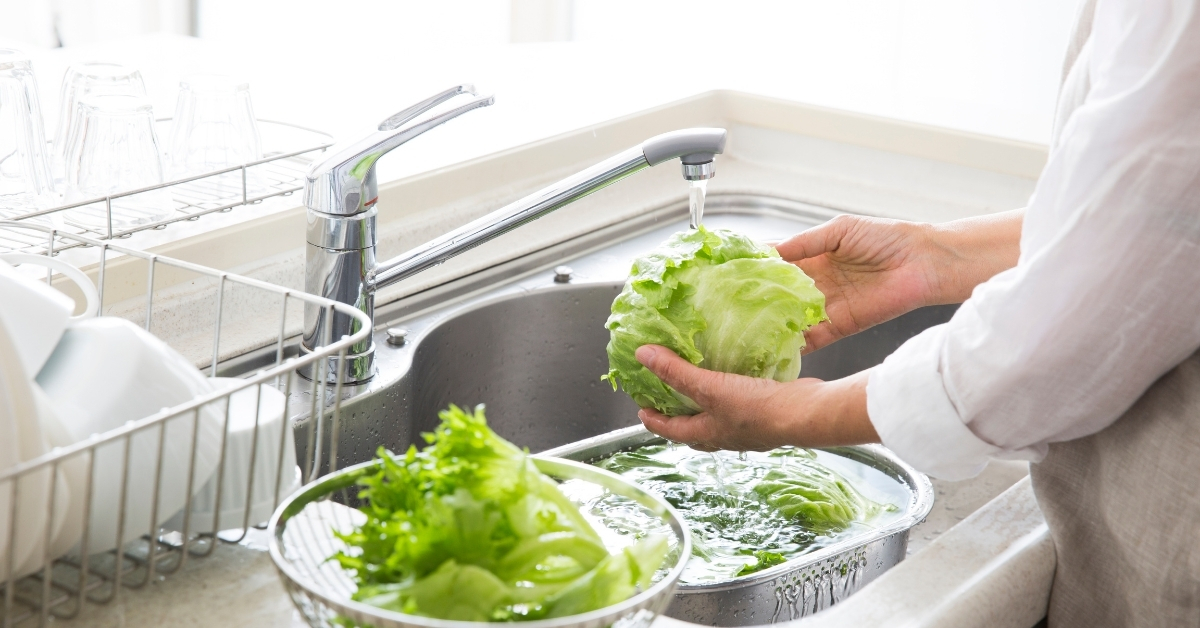
How to remove pesticides from leafy vegetables, is actually easy. Fill a bowl with room-temperature filtered water, swish the soap stick under the water for 10 seconds, separate the leaves and place your produce in the water and let soak for 5 minutes.
Strain in a colander and rinse again with filtered water. Spin in a salad spinner if you own one. If not, pat dry with lint-free linen or cotton flour sack towel and consume directly.
Hard Types of Produce
Avocados, apples, beets, peppers, parsnips, squash, rutabagas, carrots, yams, potatoes, celery, turnips, pumpkins, citrus: oranges-tangerines-lemons-limes-grapefruit, plums, figs, grapes, kiwi, tomatoes, cucumbers, peaches, celery, horseradish root, and mushrooms.
To clean hard types of produce, fill a bowl with lukewarm filtered water, swish the soap stick under the water for 10 seconds and let the produce soak for 5 minutes.
Strain the produce in a colander and rinse again with filtered water. Spin in a salad spinner if you own one. Dry the produce with a large cotton flour-sack towel and gently roll them up in the towel to pat off the excess water.
How to Clean Berries Using a Salad Spinner
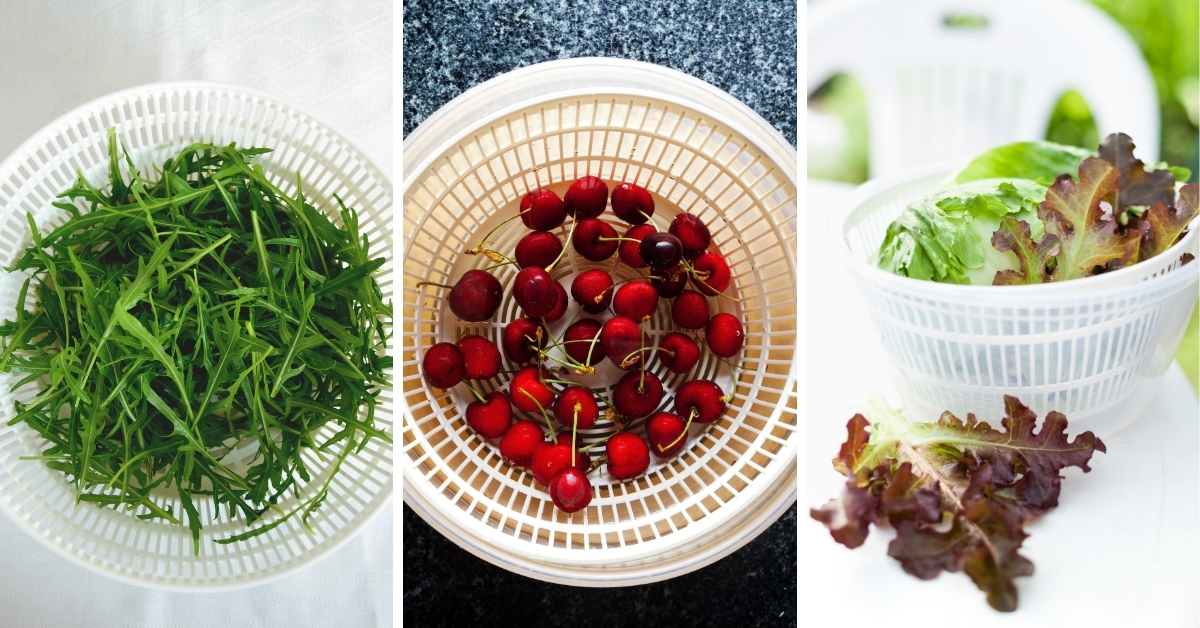
Berries cannot be washed with a stick of soap as hard skin produce can. The best way to wash berries is by rinsing underwater. Fill a bowl with cool filtered water, swish the soap stick under the water for 10 seconds and let the berries soak for 5 minutes.
Strain the berries in a colander and rinse again with filtered water. Spin in a salad spinner if you own one. Or lay the berries on a large cotton flour-sack towel and gently roll them up in the towel to pat off the excess water.
Customer Reviews on Our Natural Dish Soap
If you have considered switching to more natural dish soap, these reviews are just the icing on the cake that OUR soap is the best you could choose!
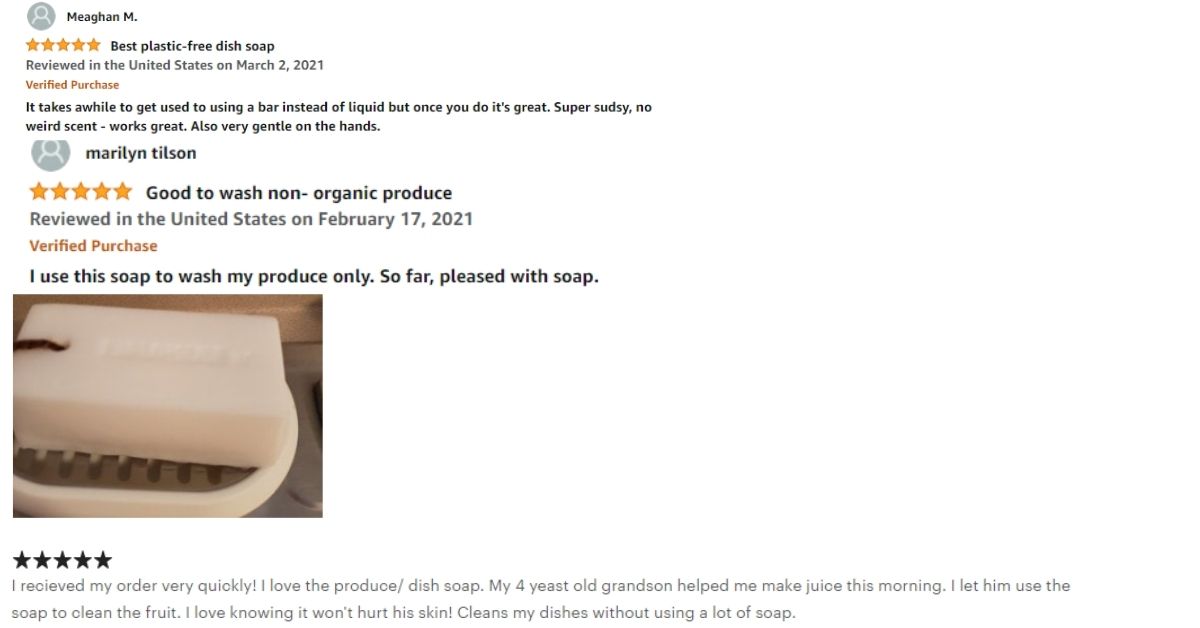
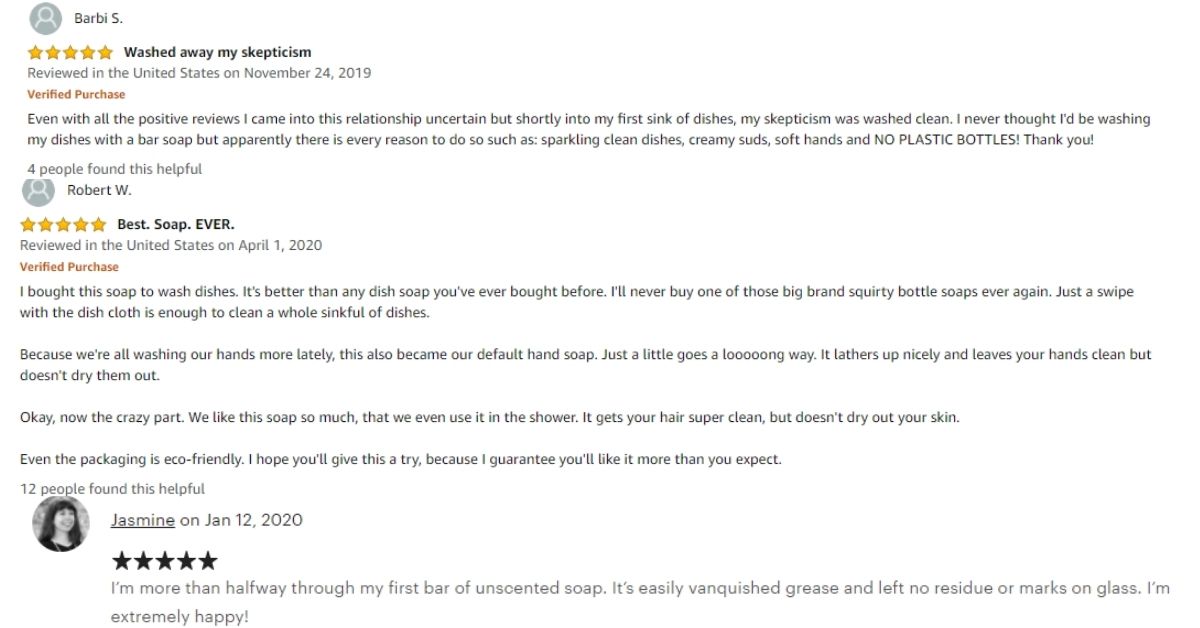
In Conclusion on How to Clean Vegetables
The CDC has a post on Foodborne Germs and Illness, read more in-depth information, and educate yourself on a serious matter that could most definitely affect your health.
I hope I have educated you or piqued your curiosity enough to want to try our unscented soap stick veggie wash. You won’t be filling the landfill due to the fact the veggie wash does not come in a plastic jug.
You can use the soap for more than just washing veggies too. I use it in the laundry room as a stain stick. I use it to wash my fine china and delicate clothes by hand. If you do try it, please let me know, I would love to share your review.
If you are new to our community you may want to follow our whole journey from the beginning, please start with this introduction to our log cabin turned farmhouse on the mountain Log Cabin Farmhouse Introduction.
Please Join Us!
Thank you for stopping by and reading our blog. If you haven’t signed up for our newsletter, please take a moment and do so. We will not sell, share, or use your contact information.
We are also an ad-free blog to better serve you with a pleasant reading experience! After joining our community, we will not inundate you with unnecessary emails. Click the button below to join our community and receive our occasional newsletter.
Please see the footer for FBC Disclaimer, Privacy Policy, Terms, and Conditions.
Shop Here
We are a participant with the Amazon Services LLC Associates Program, an affiliate advertising program designed to provide a means for us to earn fees by linking to Amazon.com and affiliated sites.
You will not incur extra fees or charges for using the links. We only recommend items we believe in and have tried. If I personally make or sell an item, I will mention this in the post for each item.
Click on the Bar of Dish Soap to Visit Our Amazon Storefront!
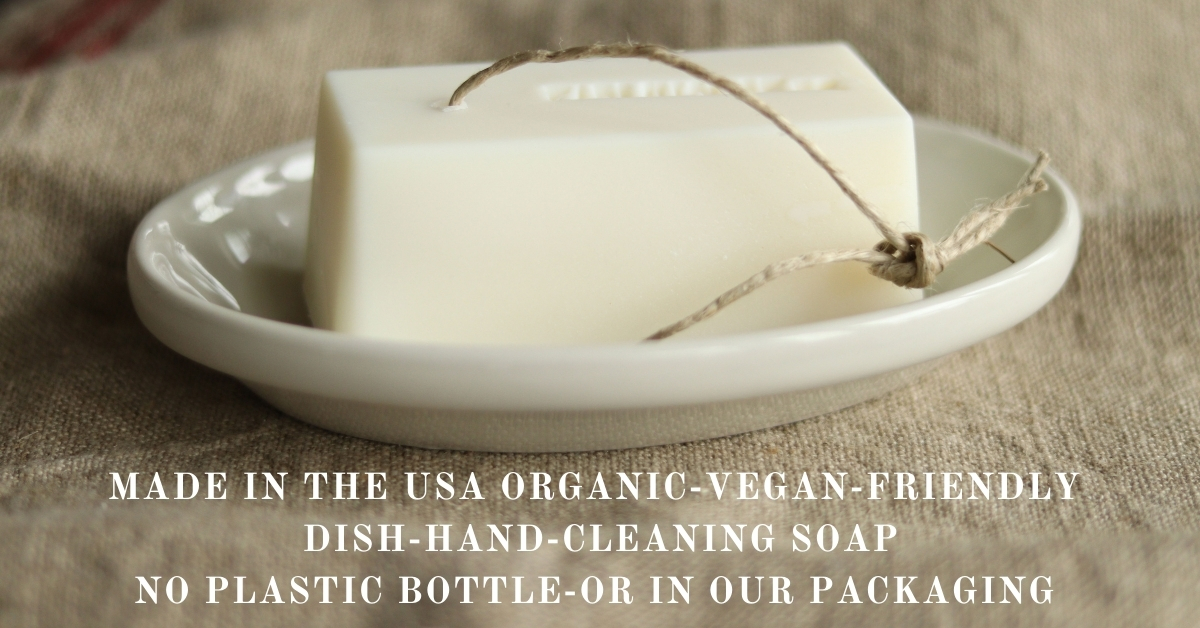
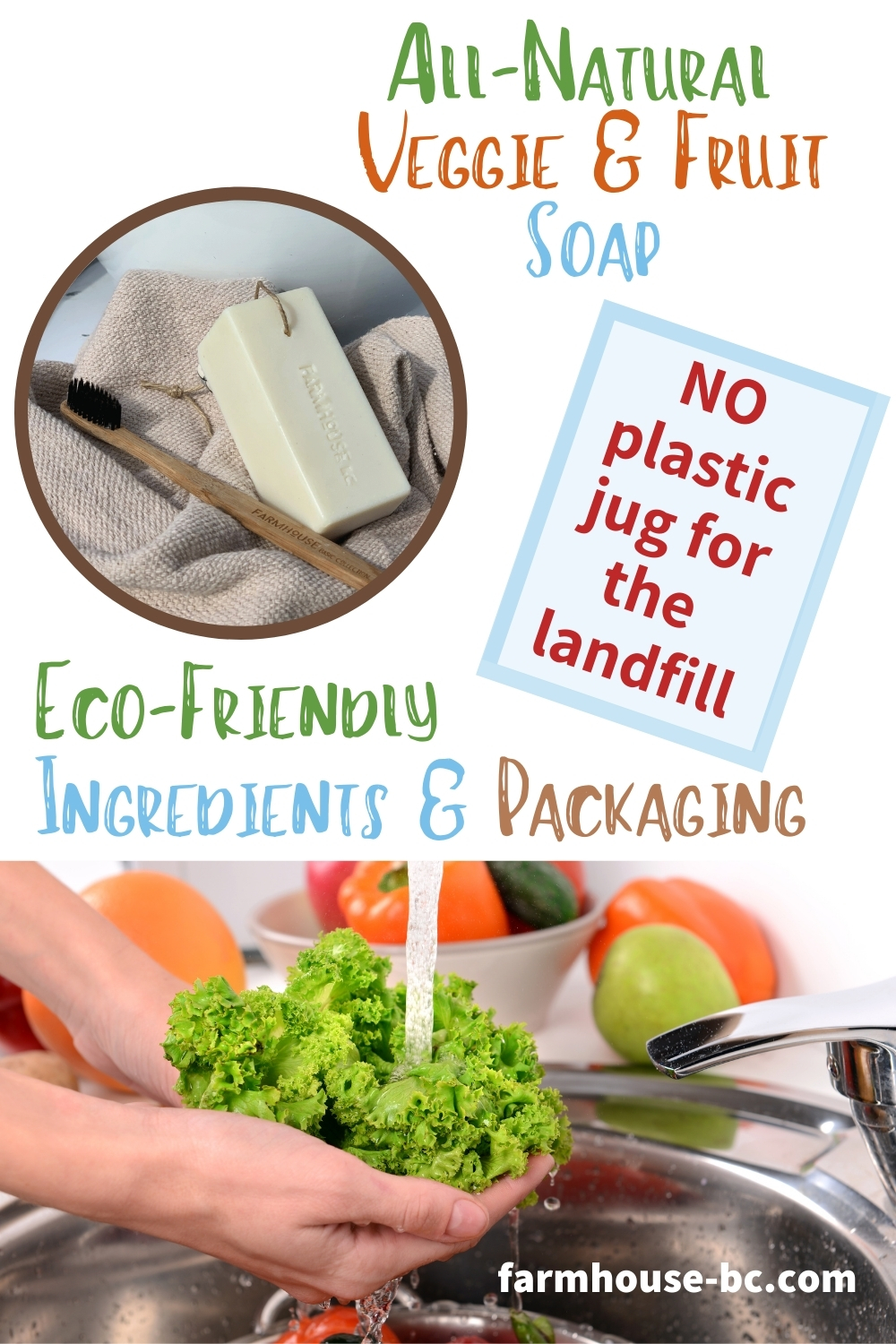
Pingback: National Black Dog Day 2022 #shorts - RhodeislandDigitalNews.com
Pingback: Fresh Lemon Curd and Coffee Cake Recipe ⋆ Farmhouse-bc
I only use my veggie wash bar of soap, for everything and never had a taste afterwords. I am not going to bash Sunlight but please read the ingredients. It’s a detergent, not an organic soap, and uses a dye. Do your own research but after 30 years, I and thousands of others can attest our veggie soap is good for everything. The commercial veggie wash comes in a plastic jug, not good for the environment and I don’t know much about it. Again, it all depends on what level you are allowed to accept as far as organic, all-natural, good for the earth, etc. I can not answer for that. Try Google for “what is the best veggie wash” for alternatives. Best of luck and thanks for stopping by 🙂
Hello,
I have read your article here.
I know I am going to get blasted, but I have been washing my fruits and veggies for about 10 years now with dish soap. I use Sunlight lemon because I noticed with the other soaps you can taste it. I wash them and thoroughly with water.
We have NEVER had any sort of symptoms of it harming us.
I honestly do not feel comfortable just rinsing with water. I feel like it is still there. When I wash broccoli with water I still see the “white” on the stalk and such. When I use the dish soap, the broccoli is actually green, like it should be. I think the only thing I don’t use the soap to wash is raspberries and black berries. Sometimes I don’t use the soap on strawberries. I rinse really well.
Any suggestions besides not using the soap? I tried using a veggie wash, but I could taste it even after rinsing it off. It didn’t last long either. I went through a bottle very quickly.
Thank you.
Pingback: Homemade mushroom soup - Farmhouse-bc
Pingback: Lemon Health Benefits - Farmhouse-bc
Pingback: Instant Pot chicken and dumplings recipe - Farmhouse-bc
Pingback: Easy fermented pickles, no canning! - Farmhouse-bc
Pingback: How to make fermented red onions - Farmhouse Basic Collection.
Pingback: Apple Pie Jam - Farmhouse Basic Collection.
Pingback: Zucchini Bread Recipes-Cinnamon and Chocolate Coffee - Farmhouse Basic Collection.
Pingback: Sweet Potato Pie, Autumn Pie, New England Pie - Farmhouse Basic Collection.
Pingback: Natural Dish Soap - Farmhouse Basic Collection.
Do you have a spam problem on this website; I also am a blogger, and I was wanting to know your situation; many of us have developed some nice procedures and we are looking to trade strategies with others, please shoot me an e-mail if interested.
Hello.This post was really fascinating, particularly since I was browsing for thoughts on this matter last Monday.
Pingback: Baking Soda Benefits and Uses - Farmhouse Basic Collection.